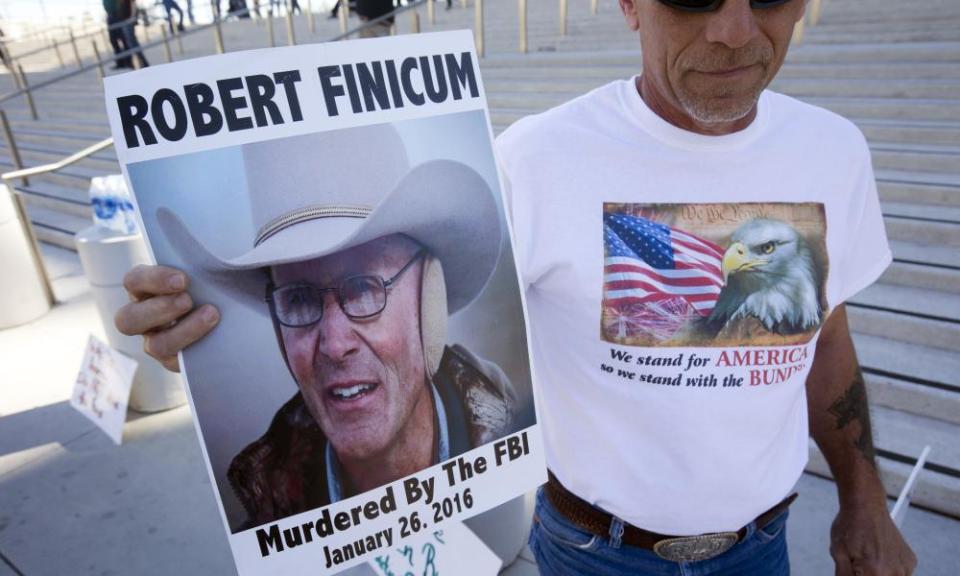FBI agent charged with lying about his role in Oregon standoff activist's killing

An FBI special agent lied about his involvement in the fatal shooting of a protester who helped lead an armed takeover of an Oregon wildlife refuge, according to a federal indictment on obstruction of justice charges.
A grand jury in Portland has charged W Joseph Astarita with three counts of making false statements, alleging that he lied when he claimed he did not fire his weapon during the attempted arrest of LaVoy Finicum, a key figure in the Oregon militia standoff at the Malheur national wildlife refuge in 2016.
The charges, revealed in federal court records on Wednesday, raise fresh questions about the death of Finicum and the FBI’s response to the high-profile protest in rural eastern Oregon, which was led by ranchers and rightwing activists, who seized federal property to protest government land regulations.
Astarita, who pleaded not guilty in federal court in Portland, was assigned to arrest the leaders of the standoff on 26 January 2016 when Finicum drove off the road and into a snowbank, before attempting to flee on foot. During the ensuing confrontation, some of which was captured on film, Oregon state police officers shot and killed Finicum, an Arizona rancher, who police say was reaching for his gun. Police later said the shooting was “justified”.
Soon after the incident, however, Astarita “knowingly and willfully made a false statement” to a supervisory special agent when he said he did not fire his weapon according to the grand jury charges. The “misleading conduct” and failure to disclose the fact that he had fired two rounds played a role in the FBI’s decision not to call a shooting incident response team to investigate, according to federal officials.
The charges follow an investigation that dragged on for more than a year and provide new insight into the dramatic confrontation on a remote highway in January that led to the arrests of a number of protest leaders and paved the way for the end of the 41-day standoff.
“We are seeing a massive cover-up,” Jeanette Finicum, Lavoy’s widow, told the Guardian last year after it emerged that officials were investigating whether an FBI agent lied after the shooting. “There’s been a lack of integrity and honesty from the very beginning … They can’t be trusted to investigate each other.”

Soon after Finicum was killed, his supporters across the west praised him as a martyr for the conservative land-use rights movement, arguing that his death was a planned and coordinated assassination by law enforcement. Investigative documents released last year fueled some of their criticisms when an Oregon sheriff’s office revealed that the FBI did not disclose shots and that there were questions about missing evidence of rifle casings not recovered from the scene.
The charges were announced months after the surprise verdict in the Oregon militia federal trial, which went in favor of the protesters. A jury found that brothers Ammon and Ryan Bundy, who led the occupation, were not guilty of conspiring against the government, a decision that outraged public lands advocates who argued that the protesters should be held accountable to discourage future armed takeovers.
The Bundy brothers and their father Cliven Bundy are currently in jail in Nevada awaiting trial on charges stemming from the family’s infamous standoff with the government in 2014 at their ranch. Cliven had long refused to pay grazing fees, arguing that the federal government has no authority to regulate the land by his property, culminating in an armed conflict that galvanized supporters from across the US.
Bill Williams, US attorney for the district of Oregon, said in a statement that Astarita’s alleged actions “do not, in any way, call into question the findings” of the investigation into the use of deadly force by Oregon state police (OSP), adding, “OSP’s actions were justified and necessary in protecting officer safety”.

 Yahoo News
Yahoo News 
